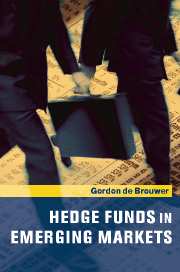Book contents
- Frontmatter
- Contents
- List of figures
- List of tables
- Preface
- 1 The issues
- 2 What is a hedge fund?
- 3 Hedge funds in east Asia
- 4 Hong Kong
- 5 Indonesia, Malaysia and Singapore
- 6 Australia and New zealand
- 7 Models of market dynamics
- 8 Inferring hedge fund positions from returns data
- 9 Looking forward
- References
- Index
6 - Australia and New zealand
Published online by Cambridge University Press: 22 September 2009
- Frontmatter
- Contents
- List of figures
- List of tables
- Preface
- 1 The issues
- 2 What is a hedge fund?
- 3 Hedge funds in east Asia
- 4 Hong Kong
- 5 Indonesia, Malaysia and Singapore
- 6 Australia and New zealand
- 7 Models of market dynamics
- 8 Inferring hedge fund positions from returns data
- 9 Looking forward
- References
- Index
Summary
Given Australia's and New Zealand's deep trade integration with east Asia, the Australian dollar and the NZ dollar depreciated substantially as the east Asian financial crisis progressed and commodity prices fell. Australia and New Zealand have freely floating exchange rates and, in both cases, substantial currency depreciation was welcomed as an effective means to stabilise domestic income in the face of a large adverse foreign demand shock. But there was a strong view in both the official sector and in financial markets that the currency falls were overdone and that, in Australia, market conditions at times became seriously disorderly.
Highly leveraged institutions were important players in both currency markets and had large concentrated positions. At least in the case of Australia, these large concentrated positions were associated with two undesirable effects. One was explicit aggressive destabilising activity by some HLIs that was designed on specific occasions to move prices to the advantage of those institutions. The other was that the very size and concentration of hedge fund positions affected the willingness of other market participants to take alternative positions, resulting in additional instability in foreign-exchange markets and overshooting of the exchange rate on the downside. These have important implications for market integrity which are explored in the conclusion.
The chapter assesses the economic context for both countries together, but reviews and assesses the market dynamics and activities of HLIs for each country separately.
- Type
- Chapter
- Information
- Hedge Funds in Emerging Markets , pp. 121 - 143Publisher: Cambridge University PressPrint publication year: 2001



